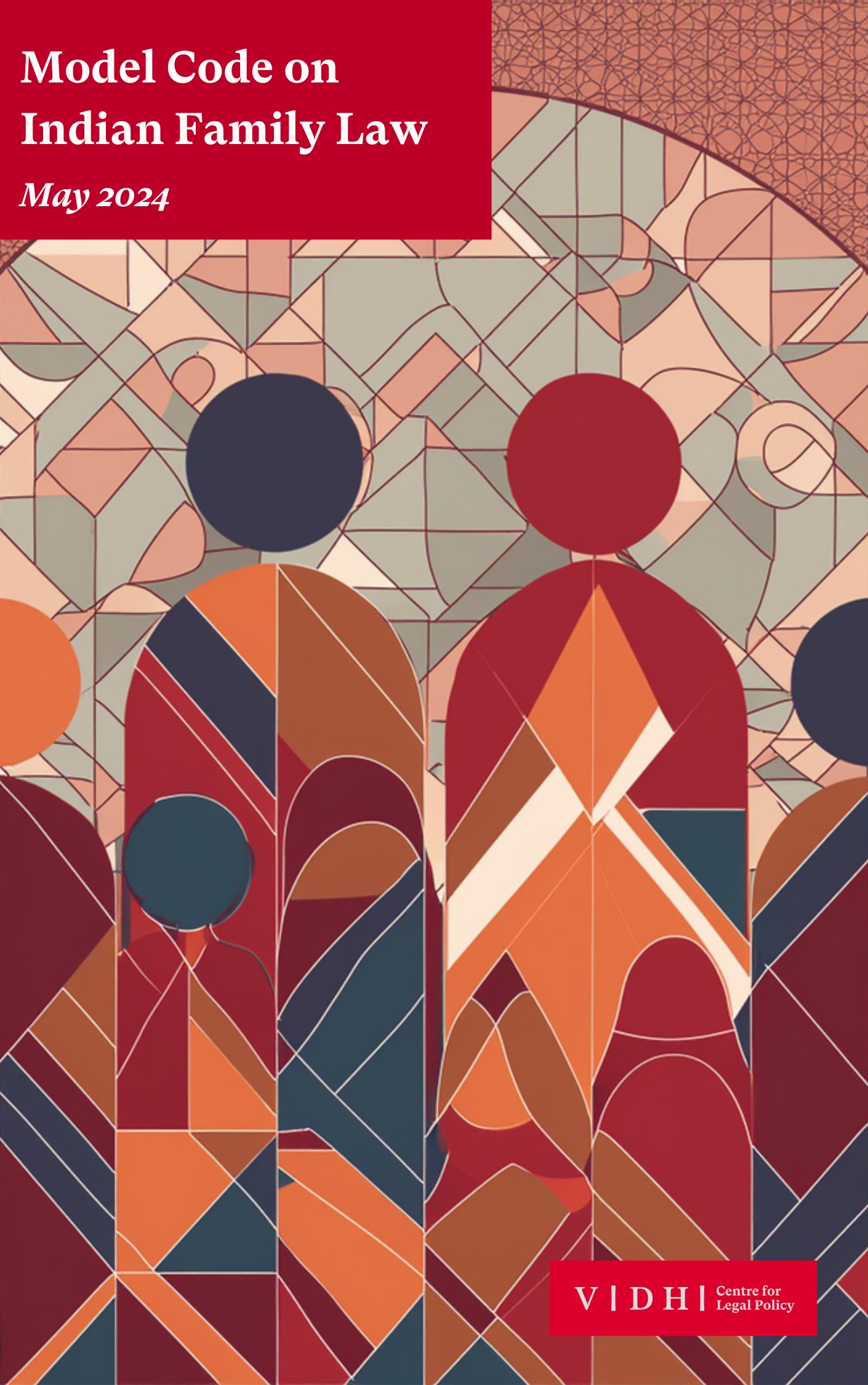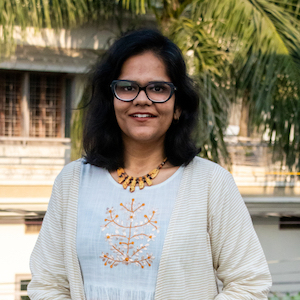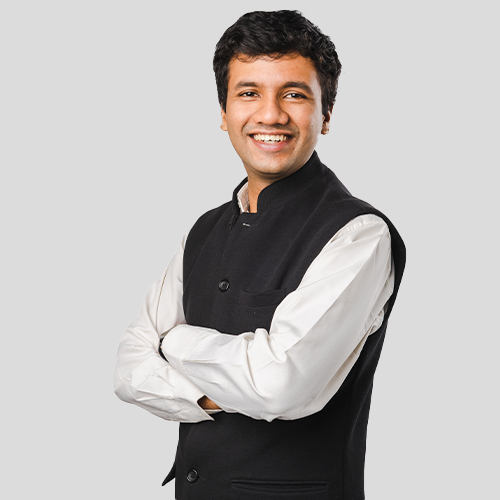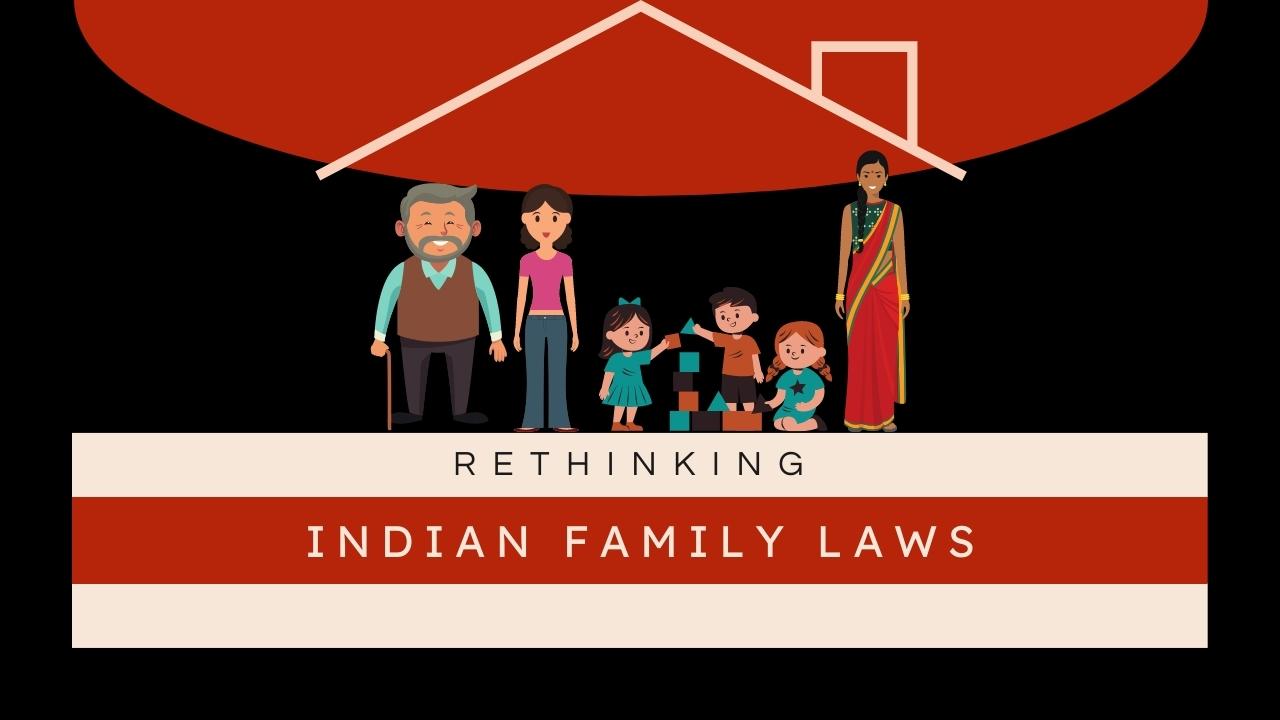
- Reports
- 9 May 2024
- 1 min read
The Model Code on Indian Family Law
A gender-just and queer inclusive family law Code
The Model Code on Indian Family Law, 2024 is a comprehensive, gender-just and queer inclusive family law Code. It is a product of year long consultations with legal practitioners, academics, members of civil society and activists. It positions itself as a progressive legal framework to aid public deliberations on the issue of family law reforms in India. The manner in which family laws must be reformed should be based on democratic consensus and rigorous deliberations.
The Model Code comprises three chapters: Adult Unions, which provides for the regulation of adult intimate relationships including marital, non-marital and atypical intimacies; parent-child relations which proposes a modern framework of parental responsibilities and rights; and succession, which provides for equal inheritance rights for all persons, and modernises the law on wills.
We hope the Model Code serves as a resource that facilitates public discourse on the critical issue of the future of family laws in India.
Filed Under
About the Authors

Aditya Phalnikar has recently graduated from the National Law School of India University. While in college, he worked for Project 39A first as a Death Penalty Research Fellow and later as a Criminal Justice Fellow. His areas of interest include criminal law, constitutional law, and philosophy.

Ayushi is a Research Fellow in the Criminal Justice Reforms team at Vidhi. Prior to joining Vidhi, Ayushi worked at Nirma University as an Assistant Professor and National Forensic Sciences University, Gandhinagar as a Teaching and Research Associate. She has also worked with the Logistic Division, Ministry of Commerce and Industry, and advised on issues related to Maritime Regulatory Framework. Ayushi graduated from Rajiv Gandhi National University of Law, Punjab (RGNUL) in 2018 with a BA., LL. B (Hons.) and obtained her LLM degree in Constitutional and Administrative Laws from the Indian Law Institute, Delhi in 2019. She is currently pursuing her doctoral studies at National Law Institute University, Bhopal (NLIU) where her research is focused on violence against sexual minorities.

Jay is a Project Fellow in the Research Director's Office. He has worked on a number of engaged projects for Ministries and statutory authorities, providing both research and legislative drafting support. Policy areas he has worked on include administrative law, real estate regulation, and probate law. He obtained his undergraduate degree in law from the University of Cambridge in 2018.

Kartavi is a Research Fellow working with the Legal Design and Regulation Team. She completed her B.Sc. LLB (Intellectual Property Hons.) from National Law University Jodhpur in 2018 and obtained her LLM degree from National University of Singapore in 2022. Prior to joining Vidhi, she also worked as a Legal Researcher at the Delhi High Court where she worked on matters ranging from service law and IPR disputes to constitutional law. Her research interests lie in the areas of access to justice, technology policy and digital divide, climate change policy and education. Kartavi also enjoys theatre, cinema and asian literature.

Mayuri is a Milon K Banerji Research Fellow at Charkha, Vidhi’s Constitutional Law Centre. Currently, she is pursuing a Ph.D from Gujarat National Law University. She obtained her LL.M in Constitutional and Administrative law from Gujarat National Law University in 2017 with a R B Mehta Gold Medal. She graduated with a B.A. LL.B. (Hons.) from Amity Law School, Lucknow in 2016. Her area of interest includes constitutional law with current research focus on areas of federalism and local government. She regularly writes research papers for various journals, national & international seminars, conferences, etc. Prior to joining Vidhi, she worked as an Assistant Professor of Law.

Rakshita is a Research Fellow with the Legal Design and Regulation team. Rakshita graduated from National Law University, Jodhpur with a B.A., LL.B. (Hons.). Prior to joining Vidhi, she has worked at the Centre for Policy Research and PRS Legislative Research. Her research areas have involved federal water governance, and health, technology and environment laws. She is broadly interested in understanding the social, political and economic contexts behind the law and how systems can be designed to better fit these contexts.

Surbhi is a Project Fellow in the Research Director Office and the Legal Design & Regulation teams. Prior to joining Vidhi, Surbhi completed her BA in International Relations from Stanford University, followed by a BA in Jurisprudence (3-year LLB) from the University of Oxford in 2023. Through Oxford Human Rights Institute, she served as a Fellow with REDRESS, working on strategic litigation and advocacy for survivors of torture. Her own academic interests lie in feminist jurisprudence, constitutional law, and human rights. At Vidhi, she has been involved with both independent and engaged projects, providing research and drafting assistance to various government entities.

Aditya is currently a Senior Resident Fellow in the Research Director's Office at the Vidhi Centre for Legal Policy. He graduated from the NLSIU Bangalore in 2021 with a BA LLB (Hons). His areas of interest include constitutional law, civil procedure, and dispute resolution. He has academic publications on constitutional law, legislative drafting, and arbitration law in journals such as Statute Law Review and Arbitration International. At Vidhi, he has been providing legislative drafting assistance to various Ministries, Departments, and Authorities of the Central Government and various State Governments.

Namrata is a Senior Resident Fellow in the Legal Design and Regulation Vertical at Vidhi. She primarily handles engaged and commissioned projects from various ministries, statutory authorities and regulators by providing legal research and legislative drafting support. At Vidhi, she has worked with the Ministry of Electronics and Information Technology, the Ministry of Economic Affairs, the Ministry of Women and Child Development and the Department of Consumer Affairs. Namrata also works extensively on queer rights and has initiated and worked on numerous projects on rights of gender and sexual minorities. She has written for the Hindu, the Firstpost, the Economic Times, the Leaflet, Article 14, Indian Express and Varta GenSex Policy Matters. Prior to Vidhi, Namrata taught at the Jindal Global Law School and the West Bengal National University of Juridical Sciences (‘NUJS’), worked with the Migration and Asylum Project on labour laws and policy, the Centre for Popular Democracy in New York City, and the Public Law and Vidhi Aid verticals at Vidhi. She has a BA/LLB from NUJS and a LLM from Columbia Law which she attended in the capacity of a Human Rights Fellow

Swapnil Tripathi is a DPhil candidate at the Faculty of Law, University of Oxford

Anuradha Bhattacharya worked as a Project Fellow in Vidhi's Corporate Law and Financial Regulation team.

Aakanksha was a Project Fellow at Vidhi Delhi. She worked on a project with the Law, Finance & Development Team, where she provides legal research and drafting support at various stages of law-making. Aakanksha works on a variety of legal and regulatory matters and allied issues in public policy. Prior to joining Vidhi, Aakanksha worked at J. Sagar Associates, Gurgaon in the General Corporate and Mergers & Acquisitions Team. She has extensively worked in employment and corporate advisory during her time at J. Sagar Associates. She has also been involved in various reported transactions. Aakanksha graduated from the Jindal Global Law School in 2019 with a B.A., LL.B. (Hons.) and obtained her LL.M. degree in International Labour Law & Employment Relations from Tilburg University, the Netherlands in 2022. She is very passionate about rights of employees engaged in the informal sector of the country

Ritwika is a Senior Resident Fellow and Lead at Charkha, Vidhi’s Constitutional Law Centre. Her current research is focused on comparative federalism, local governments, and electoral reforms. From 2014-17, Ritwika was a Research Fellow in the Public Law vertical at Vidhi. She advised several departments and regulatory authorities under the Government of India, on questions concerning constitutional validity of proposed legislation, legislative competence of the Union and states, and contours of the powers and functions of regulators. Ritwika also assisted the Union of India in preparing its written submissions in the National Judicial Appointments Commission (NJAC) Case. Between 2019-2020, Ritwika worked as a Research Associate at DAKSH, Bengaluru. She obtained her LL.M. from the University of Cambridge in 2018. She graduated with a B.A. LL.B. (Hons.)) from the Indraprastha University, Delhi in 2013, and the LL.M. from the NALSAR University of Law, Hyderabad in 2014. Ritwika is the co-editor of “Appointment of Judges to the Supreme Court of India: Transparency, Accountability and Independence” (Oxford University Press, 2018), a volume of essays addressing the politics, doctrine, and crucial developments pertaining to judicial appointments in India.

Arghya is the Founder and Research Director at Vidhi. His areas of specialisation are constitutional law and regulation of the digital economy. He has served on a number of government committees including the B.N. Srikrishna-led committee of experts on a data protection framework for India. Arghya has a number of academic publications on the Supreme Court and the Constitution in leading law journals such as Law Quarterly Review and Public Law. He is also a columnist at The Telegraph and The Times of India. He has most recently authored a book “Independence and Accountability of the Indian Higher Judiciary” (Cambridge, 2019) which builds on his doctoral work at Oxford University. Prior to founding Vidhi, he was at Oxford as a Lecturer in Administrative Law at Pembroke College.
Related Articles
-
 ;We use cookies to understand and improve our website. You can disable cookies at any time by following the steps listed in our cookie policy. To know more, read our privacy policy
;We use cookies to understand and improve our website. You can disable cookies at any time by following the steps listed in our cookie policy. To know more, read our privacy policy
Privacy & Cookies PolicyPrivacy Overview
This website uses cookies to improve your experience while you navigate through the website. Out of these cookies, the cookies that are categorized as necessary are stored on your browser as they are essential for the working of basic functionalities of the website. We also use third-party cookies that help us analyze and understand how you use this website. These cookies will be stored in your browser only with your consent. You also have the option to opt-out of these cookies. But opting out of some of these cookies may have an effect on your browsing experience.Necessary cookies are absolutely essential for the website to function properly. This category only includes cookies that ensures basic functionalities and security features of the website. These cookies do not store any personal information.Any cookies that may not be particularly necessary for the website to function and is used specifically to collect user personal data via analytics, ads, other embedded contents are termed as non-necessary cookies. It is mandatory to procure user consent prior to running these cookies on your website.